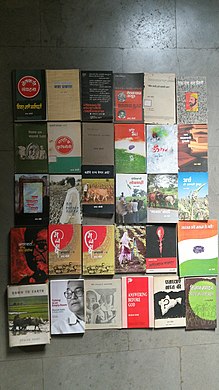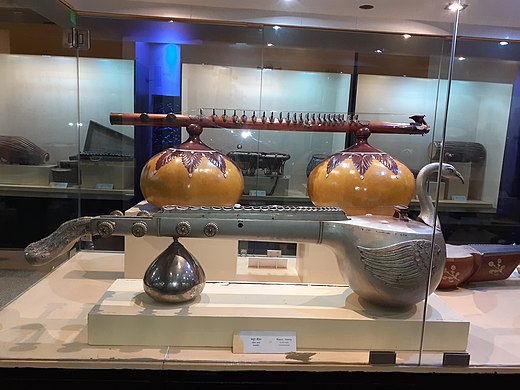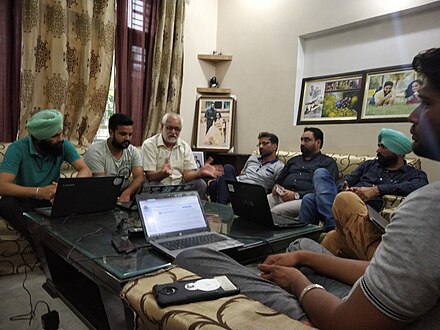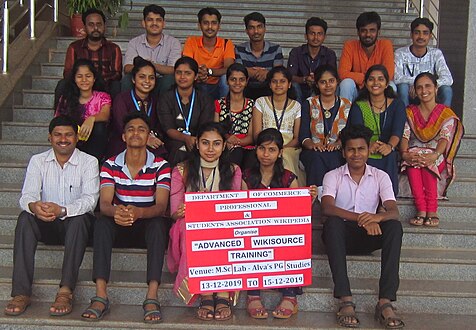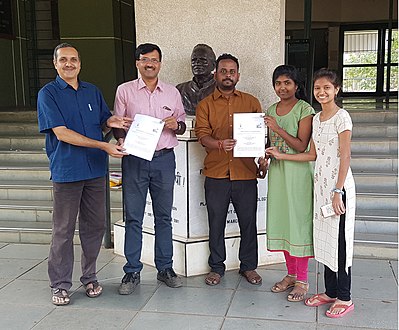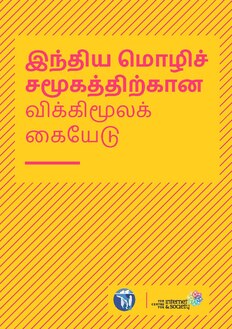Content Enrichment
What
Content creation workshops will be conducted under Project Jalbodh on Water related issues, Biodiversity, Science and Women's issues with communities of interest in these three areas. Subject experts will be involved to provide guidance. Active as well as new editors will be trained in Wikipedia editing and uploading on Wikimedia Commons to add new content in these three thematic areas.
Why
As the three topics are quite vast and significantly appear in mainstream public discourse, people need reliable and good quality content about various aspects related to them. There is also a paucity of locally relevant knowledge on these sectors on the internet. Hence this is an opportunity to connect local knowledge repositories with Wikimedia projects.
How
The thematic organisations and communities of interest will be identified from at least three language regions. The knowledge gaps in Wikimedia projects would be filled during these workshops. The active citizens and students will be mentored by subject experts and experienced activists at the grassroots in creating quality content. The follow-up programmes will be planned for nurturing and sustaining the editors.
Outcome
The knowledge resources around two broader areas viz., Resources for Sustainable Livelihoods and Women would be developed. This will be achieved through eight workshops in different places with a minimum of 130 participants. From these workshops, around 40 good articles would be produced.
Content donation from authors/copyright holders
edit
What
With the involvement of community members, a database of notable authors and their heirs holding the copyrights will be developed. The selection of literature and topics of priority will be decided through community consultation. The events for content donation will be conducted on special occasions like language day to promote the concept. The appropriate movement resources will be created for this drive.
Why
There is abundant content in the form of books, training material, manuals etc. which is not being reprinted, making it inaccessible to the society. This valuable reference material is not available offline as well as online. As most of people will be accessing the knowledge digitally, CIS-A2K has planned content donation drives and digitisation projects.
How
In the last two years, CIS-A2K approached authors and copyright holders in Maharashtra state for re-licensing of content which may used as good references. As a result of consistent follow-up, total 130 Marathi books were released in CC-BY-SA. The stepwise manual for OTRS process was developed. As the procedure is well defined, the Marathi community members have also taken initiative. The activity is gaining momentum in the state. This year, the promotional resource material will be developed to expand the activity across the state. The community members will be supported for organising these satellite events. The authors who already donated the content would be involved to provide advice on the project. The resource material will be developed in three other languages also. The process will be replicated in at least three other states. This year CIS-A2K will start a campaign to create awareness among Punjabi authors about uploading their books on Wikisource. Under this campaign, CIS-A2K will approach Punjabi authors and publishers to re-license their books. The books will be scanned and uploaded on Wikimedia Commons.
Outcome
With the help of the different communities in India, we will be able to get the following number of books under the public domain.
What
Visual documentation of thematic areas like historic campuses, folk-cultures, production processes of artisans & handicraft communities, natural resource based livelihoods etc. is an important aspect of knowledge creation. These projects will be planned with local communities and subject experts. CIS-A2K will facilitate a series of such thematic photo-walks in different regions of India with the initiative of the local language communities.
Why
Images and videos are an important aspect of Wikipedia articles. They help readers to get a better understanding of the given topic. The systematic documentation of some areas, processes and cultures is also important from historical perspective. Some such unique things are being deteriorated in the course of time. Therefore, the visuals along with subject data needs to be documented.
How
This will be done with the help of users who are interested in photography as well as documentation. The respective local communities and subject experts will be involved in the planning process. These photos will be uploaded on Wikimedia Commons with proper categorization along with Wikidata linkage. The edit-a-thons will also be conducted to add these photos in Wikipedia articles.
Outcome
Around 600 photos on Wikimedia Commons will be uploaded with the help of community members.
Digitisation with libraries
edit
What
The digitization drive would be undertaken to bring copyright free reference material in Wikimedia projects. The activity will be conducted with four libraries in two states.
Why
Several copyright-free books available in these libraries more than 60 years old and are getting damaged with time. There are very few copies left of these rare books in some libraries. The authorities here are also facing problems in the preservation of these treasures. Hence there is an urgent need to digitize these books and make it accessible in searchable form.
How
CIS-A2K facilitated the digitisation and uploading of 25 rare books published before the year 1900 from Public Library, Rajgurunagar in Maharashtra. The process was completed at Vigyan Ashram, Pabal. CIS-A2K will work with four more libraries to prepare the list of copyright-free books from various authors and sorting them according to the priority of digitisation. The methodology for updating the database of authors' birth and death details will be introduced with the language communities on Wikisource and Wikidata projects. In Punjab, CIS-A2K will acquire books from local libraries, Bhai Kahn Singh Library of Punjabi University Patiala and by using local contacts.
Outcome
A total two libraries each in Maharashtra & other states (200 books scanned & uploaded) will be covered.
-
Working with 172 years old public library in Maharashtra
-
Building archive of Shetkari Sanghatana (Farmers' Organisation)
-
Mapping of Raja Dinkar Kelkar Museum, Pune
What
The process of developing a free digital archive initiated with Shetkari Sanghatana Trust in the the last year will be continued. Similar projects will be executed with the following organisations -
Why
Various organisations are working with dedication to create knowledge repositories for more than three decades. Such repositories should be made digitally accessible in this era. There is also a need to integrate their databases, catalogues, audio & video files, books etc. with existing content on Wikimedia projects.
How
Several organisations have done some previous work towards archiving valuable content under different thematics. An understanding of their work, the nature of content and difficulties faced in archiving the same will be developed through a series of initial visits. The content will be categorized and sorted according to appropriate Wikimedia projects. The partners for digitization and further processing will be identified and trained. The content thus created will be promoted through relevant websites in academics, research and social sectors.
Outcome
The four archives will contain knowledge in the form of texts, images, audio files of speeches and music, videos, databases, manuscripts etc.<be>
Wikisource workshops
edit
Basic Wikisource Workshops
edit
CIS-A2K focused on Wikisource communities in India for the previous year. The needs of the communities were identified through consultations, help-desk and meet-ups. After analysis of the status of the projects and dialogue with active community members, CIS-A2K has planned basic editing workshops for Odia, Malayalam and Hindi Wikisource communities.
Advanced Wikisource workshops
edit
In the previous year, CIS-A2K worked closely with a few communities through basic skill-building workshops and individual support to some members. Some of the members are now editing regularly and aspire to learn advanced skills. An assessment of the exact requirements of each project will be conducted in order to design the workshops on advanced skills. It is proposed to conduct such workshops for Assamese, Gujarati, Marathi, Sanskrit, Tamil and Kannada Wikisource communities.
Outcome
At least 2 basic and 2 advance level Wikisource will be conducted.
Wikidata+Wikisource Edit-a-thon
edit
What
CIS-A2K will organize a Wikidata+Wikisource edit-a-thon to improve the data related to books on Wikidata.
Why
Wikisource works are linked with Wikidata as per WikiProject Books data modelling. But, Indic Wikisource communities usually do not work on book metadata. This workshop will help Wikisource communities learn about this important area.
How
Along with the Wikisource workshops for different language communities, Wikidata sessions will also be conducted to offer a comprehensive and holistic training on metadata curation of books.
Outcome
Around 1000 new items will be created with the involvement of the language communities in this activity.
Datathons and Labelathons
edit
What
CIS-A2K will organise one datathon and labelathon each on Wikidata.
How
They will be organized on topics of priority. The active participants will be later requested to take part in an advanced Wikidata workshop or an offline datathon.
Outcome
Around 20 participants are expected.
-
Wikisource and Wikidata training for Sanskrit Wikimedians
-
Community Meetup at Patiala
-
Participants in Women for Climate change Workshop
| 
